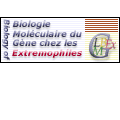
|
|















|
International Summer School
From Genome to Life:
Structural, Functional and Evolutionary approaches
CAPPONI Cécile |
|
Universite de Provence, LIF - CNRS, Technopole De Chateau Gombert, 39, Avenue Joliot-Curie, Marseille Cedex 13 13453, France title: The Knowledge System AROM AROM is a knowledge representation system which features many ways for the modelling, the storage, and the evolution management, of several kinds of knowledge. Taxonomies of classes and relations between classes can be described and populated by objects and tuples. A classification mechanism finds the appropriate structure an object or a tuple could be attached to. These characteristics of AROM makes it quite useful in biology whenever we consider a systemic view. AROM features also a problem-solving environment named AROM Task, connected to the traditional knowledge base. Problems, solving methods, and solving strategies, can be described and launched, involving classes, relations, objects and tuples. Problems are organized within hierarchies, each one is associated with several solving-methods. The selection of the right method to solve a given problem depends on (1) the chosen strategy (2) the results of classification, and (3) the available stored knowledge. In biology, such a capability is interesting for it permits to connect the data, the way this data was obtained, and the way this data is used to produce more data. AROM allows the bioinformatician to embed, within a single system, systemic biological knowledge: declarative knowledge and methodological knowledge cohabit, for a suitable modelling of any biological assembly. |